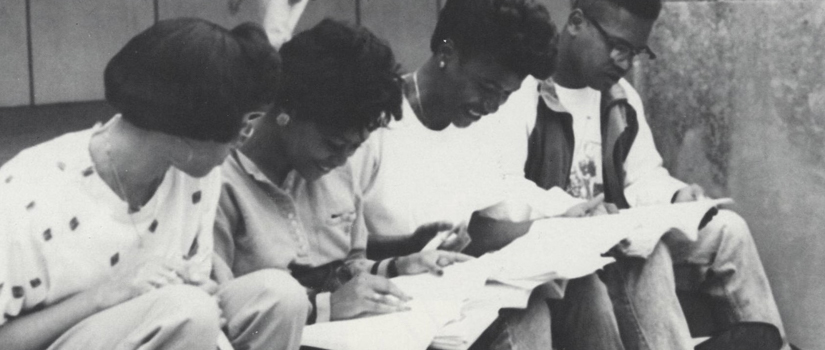The University of South Carolina’s African American Studies Program (AFAM Studies) was established in 1971 after years of organizing by student activists, faculty, and administrators.
The idea for creating the program grew out of an interest by a group of socially conscious student activists who were also members of the newly formed campus organization called the Association of Afro-American Students. That organization’s main objectives were to bring together people with a common outlook, establish links to the outside community, and provide a voice for the university’s Black students through campus programs and discussions with faculty, other campus organizations, and administrators.
In 1968, Dr. Tom Terrill of the Department of History began to offer a “Negro History” course, which he developed with his colleague John Scott Wilson. Students in the course were enthusiastic and deeply engaged during classroom discussions about race relations, civil rights, and the legacies of slavery and segregation. Historian Ramon Jackson later described the course as “part of an initiative to amend the Eurocentric nature of historical inquiry and scholarship on America’s past.”
Two enterprising Black students in the course, Luther Battiste and Harry Wright, were asked by Terrill to join the Committee for Curriculum Revision, where students, faculty, and administrators were exploring the possibility of a Black Students program at the University.
In the summer of 1969, Battiste and Wright created a proposal for a Black Studies program at the University of South Carolina built on the recommendations of the committee and their own research into existing Black Studies programs at the University of North Carolina, Yale, Duke, and Emory. Dr. Bruce Marshall, a professor of International Studies, worked with Battiste and Wright as a faculty representative and helped connect them with Black Studies programs at other universities.
In 1970, a final proposal was ratified, and the African American Studies Program was born a year later.
The mission of the African American Studies Program is to serve as an interdisciplinary program with the purpose of broadening the university’s curricula to include the social, political, cultural and historical experiences of African Americans in the United States and across the globe.
AFAM Studies was first led by Willie Harriford, a former archivist at the Harry S. Truman Presidential Library. Harriford’s prior experiences as a history student and archivist shaped his vision for the AFAM Studies Program. His purpose was to encourage awareness and appreciation of the Black perspective on historical events and cultural developments, over time.
During his tenure, Harriford was challenged with convincing students and parents of the value and practicality of studying the new discipline. Another challenge came from student demand that the university hire more Black professors to teach the AFAM Studies courses, all the while the program was constantly strangled by decreased support by university administrators.
Decreased administrative support, a limited budget and small faculty forced Harriford to get creative with what resources were available. That came in the form of recruiting Black faculty from other departments to teach AFAM Studies courses, thus establishing the dual faculty roles that endure today. By the 1980s, students were able to declare a major in African American Studies.
In the early 1990s, the program was in decline due to a continued lack of resources and a “longstanding pattern of institutional neglect,” according to Jackson. However, the program was revived through the efforts of dedicated faculty, student leaders, and administrators were determined to support African American Studies as a discipline and show the university’s commitment to diversity. In these years, alumni continued to support the program. Past director Dr. Valinda Littlefield noted that Dr. Harry Wright served as a member of the Committee on the Future and Direction of African American Studies in 1994. Wright later served on the Partnership Board, providing financial support and advice to several directors.
For the last 50 years, the program has focused scholarly attention on the culture, achievements and contemporary problems facing African Americans who comprise more than a quarter of the population in South Carolina.
Learn More About Our History
In his essay “Peace, Love, Education, and Liberation: The Black Campus Movement at the University of South Carolina,” Dr. Ramon Jackson explored the history of our program, and the social and political climate surrounding its creation while highlighting the voices of many of African American Studies’ earliest students and faculty.
It is available in the forthcoming book Invisible No More: The African American Experience at the University of South Carolina
edited by Robert Greene II and Tyler D. Parry (University of South Carolina Press,
2021).
Many thanks to Dr. Jackson for sharing his research with us and for permission to
quote from his chapter.
